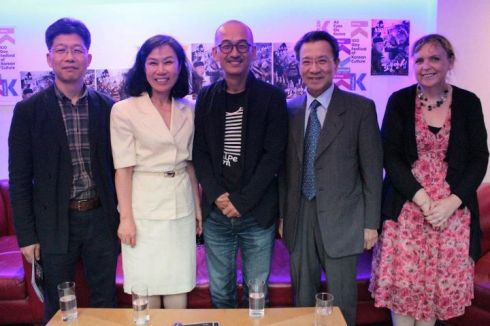Having recently won 15 awards at the 49th Daejong Film Awards, Masquerade is a sumptuous period drama about a man who would be king. Set during the Joseon era (1450-1750), Masquerade embellishes on historical fact by imagining scenario in which the 15th King of the Joseon Dynasty, King Gwang-hae has been poisoned, and a court clown, Ha-Sun, is persuaded to impersonate the King during his recovery – thus explaining the 15 missing days in the Court records during the reign of King Gwang-hae.
South Korean actor and heart-throb, Lee Byun-hun, plays the dual roles with intensity and skill, and indeed this is the best performance that I have seen from him. The mechanics of the daily life and rituals of the Court are visualized in detail, offering many a humorous moment including Ha-Sun’s first Kingly bowel motion which is performed in front of a large audience of palace women and servants to his overt dismay and the overt delight of the packed audience present for the closing gala of the London Korean Film Festival. As Ha-Sun becomes more immersed in his role as King, he begins to assert his own voice on behalf of the people rather than allowing Court officials, and the desires of the wealthy to influence his decisions. As a result, officials begin to suspect that the King is not actually the King, but rather an impersonator and seek to reveal his true identity.
There is no doubt that Masquerade is a aesthetically stunning piece of filmmaking, or that the performances of the key players including Lee Byun-hun are extremely good, but I found that I did not emotionally connect with the film in the way in which most of the audience did during the screening. Whether this is due to the fact that I felt that the female roles were not fully developed, or that I did not find Lee Byun-hun charismatic enough in the central role (and I suspect that I was the only one judging by the hysterical reaction that Lee Byun-hun got when he entered the cinema) I am not sure. Personally I liked both The King and the Clown (왕의남자, Lee Jun-ik: 2005) and Shadows in the Palace ( 궁녀, KIM Mee-Jeung: 2007) more in terms of South Korean period drama, which might be simply because of my preference for a darker cinema that toys with your emotions, which both films do so effectively.
Whether Masquerade will be the South Korea film to make an impact on the international box-office, as is hoped, I think is debatable. I wonder whether it is too dialogue centred and action light to be the sort of “Oriental” fantasy that Western audiences consume so avidly, but of course I could be wrong – and I suspect I may be here. In the final analysis, I hope that Masquerade does well as it is the antithesis of the South Korean festival film that audiences in the West seem to privilege over commercially orientated cinema. As much as I am a fan of KIM Ki-duk, KIM Ji-woon and PARK Chan-wook, it is such a shame that the other side of South Korean cinema does not get enough recognition or appreciation in the West. It is about time that this changes, and the variety of films at the London Korean Film Festival clearly demonstrated the breadth and variety of contemporary South Korean Cinema, of which Masquerade is an excellent example.






